Holidays in the Sun
Cook/Jones/Rotten/Vicious
Published by Warner Chappell Music Ltd
’Never Mind the Bollocks’
Produced by Chris Thomas
Engineered by Bill Price
Recorded at Wessex Studios, London, June 1977
John: We tried our holiday in the sun on the Isle of Jersey, and that didn’t work. They threw us out. Being in London at the time made us feel like we were trapped in a prison camp environment. There was hatred and constant threat of violence. The best thing we could do was to go set up in a prison camp somewhere else. Berlin and its decadence was a good idea. The song came about from that. I loved Berlin. I loved the wall and the insanity of the place. The communists looked in on the circus atmosphere of West Berlin, which never went to sleep, and that would be their impression of the West. I loved it.
Steve: ‘Holidays in the Sun’ was inspired by our trip to Berlin, by the wall, where it was raining and depressing. We had to escape from London at the time, the song pretty well sums up the trip.
Bodies
Cook/Jones/Rotten/Vicious
Published by Warner Chappell Music Ltd
‘Never Mind the Bollocks’
Produced by Chris Thomas
Engineered by Bill Price
Recorded at Wessex Studios, London, August 1977
Paul: You had to keep your distance from Pauline. She was a mad fan who used to turn up everywhere. She was dangerous and very crazy, someone you really had to worry about. She was a pretty girl, but she had these really mad eyes.
Steve: Everything, tune and lyrics inspired by the infamous Pauline from Birmingham. The girl with the crazy look who would follow us around. The mad opening of the song still reminds me of her.
John: Pauline was a girl who used to send these letters to me from some nuthouse up north in Birmingham. She was in mental asylum. She turned up at my door once wearing a see-through plastic bag. She did the rounds in London and ended up at everybody’s door. There’s a line in the song about Pauline living in a tree. She actually had a treehouse on the estate of this nuthouse. The nurses couldn’t get her down and she’d be up there for days. Apparently, punk rock pulled her out of her cocoon… She might have had wealthy parents who buggered up her life, probably like Nancy Spungen really. She was one of many lunatics that used to attach themselves to us.
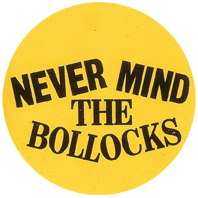 No Feelings
No Feelings
Cook/Jones/Matlock/Rotten
Published by Warner Chappell Music Ltd
‘Never Mind the Bollocks’
Produced by Chris Thomas
Engineered by Bill Price
Recorded at Wessex Studios, London April/May 1977
John: ‘No Feelings’ originally came from a Steve Jones riff. It would work this way. One night someone would have an idea and then everyone else would just build around it until it was done. It’s a haphazard way, but that’s the way it was. You don’t need to be technically proficient at your so-called art to write songs. If you are musically proficient, usually you won’t be any good at writing songs because you won’t be able to express your feelings. You’ll be bogged down in the technology of note perfection’s, set patterns and set ideas.
Glen: Very rock ‘n’ roll, courtesy of Steve. Knocked into the overdrive by John’s blatant vocal. This was probably the only fast song we had. If you listen to anything by the Pistols you’ll be surprised how slow it is. ‘No Feelings’ is quite fast, the rest are medium paced.
Steve: This came together so easy. I came in, going mad on guitar, John went mad on vocals and that was it… easy.
Liar
Cook/Jones/Matlock/Rotten
Published by Warner Chappell Music Ltd
‘Never Mind the Bollocks’
Produced by Chris Thomas
Engineered by Bill Price
Recorded at Wessex Studios, London, April/May 1977
Paul: We never used to believe anybody then. ‘Liar’ was one of the earliest songs that John and Glen worked on together. It was the friction in the band that made it work well.
John: Self explanatory, really, considering the manager we were working with…
Glen: At a gig inside Chelmsford Maximum Security Prison, John announced this as being about then Prime Minister Harold Wilson. I was pretty relieved as I thought he was having a poke at me.
God Save The Queen
Cook/Jones/Matlock/Rotten
Published by Warner Chappell Music Ltd
‘Never Mind the Bollocks’
Produced by Chris Thomas
Engineered by Bill Price
Recorded at Wessex Studios, London, March 1977
Paul: It started with Glen’s bass riff. Steve got hold of it, then I started playing. Suddenly John came up with ‘God Save The Queen.’ We thought, What’s this? It wasn’t written specifically for the Queen’s Jubilee. We weren’t aware of it at the time. It wasn’t a contrived effort to go out and shock everyone. No way. It didn’t even click there was a Jubilee coming up.
John: The whole thing was written in one go. I had the lyrics ready. I wrote them a while back, but never used them. The words didn’t fit in with any of the other tunes. I didn’t think it would ever fit to anything. It was more like a big tirade. It was excellent that it did fit in with the pattern that Glen had. Steve fell into it very quickly. Paul aided and abetted it very quickly with the drums.
Glen: The main riff was something I found piddling around on the piano, while we recorded the aborted version of ‘Anarchy’. I had a pretty fixed idea of how the tune should go, but John had other plans.
Steve: One of my favourites. I liked the chaos surrounding this record! Recorded after just two takes, with guitar and drums, like most of the other tracks.
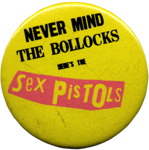 Problems
Problems
Cook/Jones/Matlock/Rotten
Published by Warner Chappell Music Ltd
‘Never Mind the Bollocks’
Produced by Chris Thomas
Engineered by Bill Price
Recorded at Wessex Studios, London, April/May 1977
John: We had run out of ideas for songs, a major problem. The idea was put to Steve, the guitar hero of the band, who couldn’t come up with any riffs at all that particular evening, to put something together using an A, B, C, and D chord sequence. As the song progressed it got better. The cynicism of the title and the chords being A, B, C, D is still there. We didn’t add any bridges. We were very good at burning them though.
Glen: Real bad mood at Denmark Street, nothing happening, I played the first thing that came into my head to get things going and Paul immediately picked up on it and we had the main riff. Steve had this idea which became the chorus and John supplied the lyric, real spontaneous.
Steve: A simple chord sequence, which I still like. The same goes for the lyrics. We had plenty of problems at the time.
Seventeen
Cook/Jones/Matlock/Rotten
Published by Warner Chappell Music Ltd
‘Never Mind the Bollocks’
Produced by Chris Thomas
Engineered by Bill Price
Recorded at Wessex Studios, London, April/May 1977
John: It was originally called ‘Lazy Sod’. The song was already set up by the others before I came along. I remember laughing at Steve’s original words. I couldn’t read the original set of lyrics, and Steve couldn’t remember them. Everything was misspelled. “I’m all alone, Give a dog a bone.” That was one of the original lines.
It was about being young, having nothing to do, and going through the typical emotions that every seventeen year old goes through. You are lazy, you don’t see any future, and you really don’t care. You give up before you even begin. Everybody goes through that period. Unfortunately most English people stay there.
Glen: Another pretty early effort, both music and initial lyrics being down to Steve. However, John got hold of it and put in a much higher orbit… I always thought it funny-peculiar that despite our youth, we still felt obliged to knock a year or two off our ages in the early interviews.
Anarchy in the UK
Cook/Jones/Matlock/Rotten
Published by Warner Chappell Music Ltd
‘Never Mind the Bollocks’
Produced by Chris Thomas
Engineered by Bill Price
Recorded at Wessex Studios, London, October 1976
Glen: I had this idea for a sort of ‘theme tune’ and had been knocking ideas about at home, but nothing concrete. We’d had yet another ruck about who and who wasn’t pulling their weight. Steve was short of ideas and snapped at me, “You’re so fucking clever, what have you got!?” Well, not a lot, but he’d well and truly put me on the spot, so with this vague fanfare idea in mind, I jammily came up with the whole chord sequence, there and then. John came up with these amazing lyrics half an hour later, the rest, history. The only thing that bugged me about this was the dreadful ‘Antichrist’ / ‘Anarcheeest’ rhyme…
Steve: Glen came up with a clever riff. Ditto John’s lyrics. I turned up the guitar and thrashed away. Paul somehow held it all together, a classic.
John: I kept really quiet that evening. I had written the words down while they were in the corner arguing. I used to have terrible trouble rehearsing because I was so fucking shy about it. I always wanted to be brilliant, excellent, loved and adored right from the start. When I finally finished the words, Glen was absolutely furious. He thought it was appalling and a silly idea for a song. I proved him right.
Paul: It was Glen’s riff originally, and Steve beefed it up. Glen felt a little precious about it being his song. He was upset about John’s terrain being thrown over the top. John and Glen had such different ideas, and Steve and I were in the middle. But I thought the tension was working. ‘Anarchy’ was the classic example of everything working perfectly.
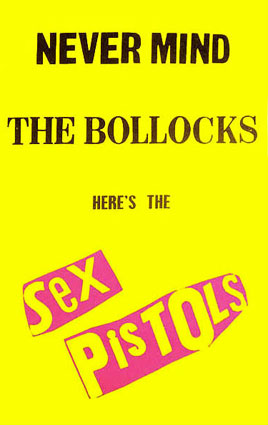 Submission
Submission
Cook/Jones/Matlock/Rotten
Published by Warner Chappell Music Ltd
‘Never Mind the Bollocks’
Produced by Chris Thomas
Engineered by Bill Price
Recorded at Wessex Studios, London, June 1977
John: We were in Camden Town rehearsing at the Roundhouse for a small period. The arguments between Glen and me became severe by this time. Malcolm finally insisted we go to a small pub upstairs and sit down and work it all out. We did. We were given 20 quid to sit down and get drunk and put our differences aside. The result was we both got along on the Doors. The Doors was the common ground, we found a band we, shockingly, both liked.
Paul: ‘Submission’ had a classic riff that’s been done millions of times before. We slowed it down. It was similar to that Doors riff in ‘Hello I Love You’, The Who’s ‘Can’t Explain’, and the early Kinks. We made it more subversive.
Glen: This was an early one. Malcolm had been constantly nagging me to write a song about bondage, “How about calling it Submission”? I told John about Malcolm’s idea and we both groaned about it.. A couple of minutes passed and with a wicked gleam in his eye John said, “How about a submarine mission?” Take the piss and shut Malcolm up in one fell swoop. We sat there and traded lines.
John: Malcolm gave us a list of words and ideas. It was so funny. One of the words was “submissive”. We turned it into “Sub Mission”, a submarine mission. Glen and I enjoyed the humour of it all I don’t think Malcolm did. That was the first and last managerial musical intrusion ever.
Pretty Vacant
Cook/Jones/Matlock/Rotten
Published by Warner Chappell Music Ltd
Taken from the LP ‘Never Mind the Bollocks’
Produced by Chris Thomas
Engineered by Bill Price
Recorded at Wessex Studios, London, March 1977
Glen: Well before ‘Anarchy’, this was the flag we waved. To cut a long story short, I was short of a riff. Abba’s ‘SOS’. came on the jukebox and hey presto! I had it. But you’ve got to know where to look… I wrote the lyrics, apart from a couple of lines John later changed. I’d written something like, “If you don’t like it, stick it up your bum”. John changed it to, “Stick your cheap comment, we know we’re for real”. Which is a far better lyric.
Paul: Glen reckons the original riff was influenced by Abba’s ‘SOS.’ I can’t see how he worked that out. It’s about being young and hanging around being vacant.
Steve: A Great intro with lots of layered guitars and great chorus, which I really beefed up. I liked to beef up Glen’s tunes.
John: Steve toughened it up because the original guitar line was very sissy. Glen wanted it to be very nice. My accent would have been on “Vacant”. Glen’s would have been on “Pretty”. “Va-cunt” is me all over. I love to play with words and throw them into different arenas. They didn’t mind it on the radio because they didn’t know.
New York
Cook/Jones/Matlock/Rotten
Published by Warner Chappell Music Ltd
‘Never Mind the Bollocks’
Produced by Chris Thomas
Engineered by Bill Price
Recorded at Wessex Studios, London, April/May 1977
Paul: Malcolm had this big thing about the New York Dolls. He loved New York and thought it was all so great, he’d been there once. ‘New York’ was originally Steve’s riff and John came up with the lyrics to wind up Malcolm.
John: The only thing anyone knew about this so-called New York scene was what Malcolm would tell us. It was hard to listen to the same old stories night after night, slightly changed each time. It got blown out of all proportion and the mythology of it became unbearable. The song is a reaction to that. It used to be spectacular fun to play the song live. The folks at the Longhorn Ballroom in Texas had the same opinion as us about New York. Everything that came out of there was poetry based and too arty. These people were much older than us and had more old-fashioned attitudes, they still do!
Glen: The original bass-line and chords started out as a 60′s spy TV theme effort, a bit like ‘Danger Man’ or something. John mercilessly crucified the New York scene and that was the size of it.
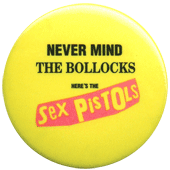 EMI (Unlimited Edition)
EMI (Unlimited Edition)
Cook/Jones/Matlock/Rotten
Published by Warner Chappell Music Ltd
‘Never Mind the Bollocks’
Produced by Chris Thomas
Engineered by Bill Price
Recorded at Wessex Studios, London, March 1977
John: I recommended a lousy record company every time you run out of songs. The material is glorious. It’s one of my faves of the lot. Again, it’s not done in the way a song technically should be. These songs break so many traditions of songwriting. Isn’t it funny? After sacking the Pistols, EMI ends up with them again 25 years later.
Glen: Steve’s baby, but the original bass-line was cool…
Paul: We weren’t trying to be clever. Just blatant. EMI. You know what this is about. Direct.
I Wanna Be Me
Cook/Jones/Matlock/Rotten
Published by Warner Chappell Music Ltd
B-side of ‘Anarchy in the UK’ 7” single
Produced by Dave Goodman
Originally recorded at Denmark Street rehearsal room, London, July 1976
Mixed/Overdubbed at Riverside Studios, London, July 1976
Paul: We worked on this song at our rehearsal studio in Denmark Street, a famous musical area in London. It was just an old shack out the back of Tin Pan Alley. We’d be there every night rehearsing and writing songs. The rehearsal room was downstairs, and there was a living dump upstairs. Steve used to stay there a lot because he didn’t have anywhere to live. Glen, John and I used to stay there on and off.
Glen: Simple music. Paperback writer lyrics; the ‘Nick Kents’ of this world.
Steve: Another early tune recorded in our rehearsal room in Denmark Street, our base at the time, where we’d meet, hang out and fight!
Did You No Wrong
Cook/Jones/Matlock/Rotten
Published by Warner Chappell Music Ltd
B-side of ‘God Save the Queen’ 7” single
Produced by Chris Thomas
Engineered by Bill Price
Recorded at Wessex Studios, London, March 1977
Paul: ‘Did You No Wrong’ was one of the only songs that came along before John joined. We were just learning still. We finally recorded it properly at Wessex for the B-side of ‘God Save The Queen.’
John: I changed the lyrics because I didn’t like the niceties of the song. It’s a News Of The World epic, which is a fairly good indication of where I was heading. Completely anti-social.
Steve: One of our early songs. A bit of an old-fashioned riff, but a good one. We would open the set with this at the first gigs.
No Fun
(The Stooges)
Published by Warner Chappell Music Ltd
B-side of ‘Pretty Vacant’ 7” single
Produced by Dave Goodman
Recorded at Wessex Studios, London, October 1976
John: ‘No Fun’ is a song I love. We made up that version on the spot. I always wanted to do it. I asked Steve to learn the riff, which he did very quickly. Paul filled in, and it went on from there. I hummed and hawed around the words because I didn’t quite know them. That’s fairly typical of me. While I love the feel of ‘No Fun’ , I don’t like the actual lyrics. I think they’re flippant in some places while they can be very astute in others. No fun was definitely what we were having at that particular time.
Satellite
Cook/Jones/Matlock/Rotten
Published by Warner Chappell Music Ltd
B-side of ‘Holidays in the Sun’ 7” single
Produced by Chris Thomas
Engineered by Bill Price
Recorded at Wessex Studios, London, April/May 1977
John: It’s the story of the travelling nonsense, around the satellite towns of London, and picking up enough money to survive for a day or two. We had to do it, but in a way, that’s what built the Sex Pistols crowd. They came from all those godforsaken new towns; Milton Keynes, St Albans. As bad as it was in London for young people, they had nothing at all in the satellite towns. No social scene, nothing.
Paul: There was another reason we liked playing a bit further out. There was a bit of a buzz about the band before we even played a gig. It was ridiculous. We were this band that had something to do with Malcolm and the Sex Boutique, and Seditionaries. We wanted to do some gigs for ourselves, get together as a band and beat each other up on a transport van away from the motorway.
John: We didn’t have Malcolm McLaren’s friends turning up at those gigs. At that time it was just a clothes horse display by that lot. None of the band wanted to be a part of that.
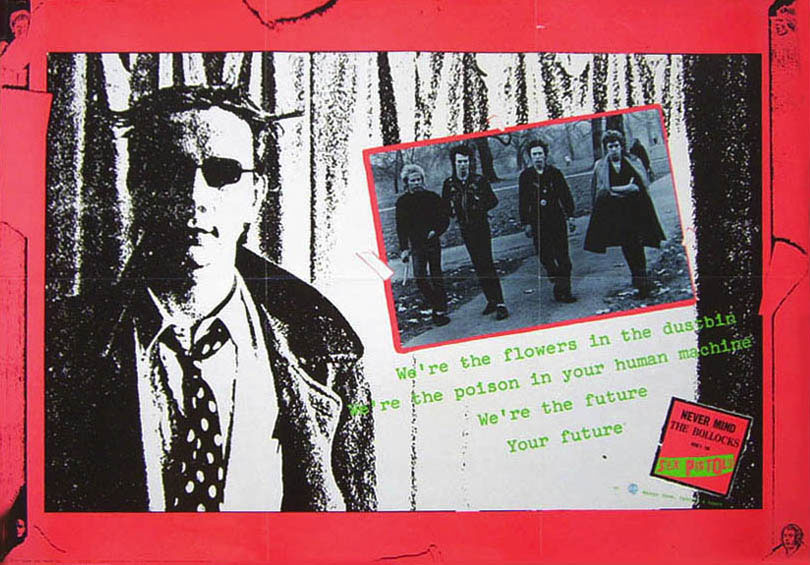
Picture Credits: (Top to Bottom)
NMTB US promo poster, 1977
NMTB promo sticker, 1977
NMTB badge, 1977
NMTB UK promo poster, 1977
NMTB badge, 1996
NMTB US Flowers in the Dustbin promo poster, 1977